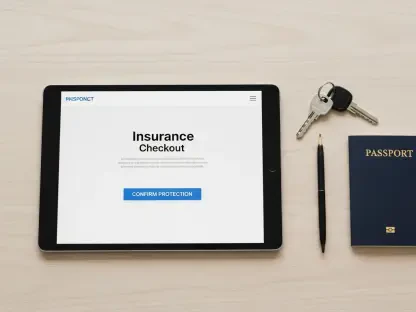What happens when the safety net you rely on during a rideshare trip turns out to be an illusion? In California, millions of Lyft passengers may have been paying for insurance that was never meant to protect them, leading to a staggering class action lawsuit filed in federal court against Allstate Insurance Company and its subsidiary, North Light Specialty Insurance Company, for orchestrating a deceptive scheme. This case, unfolding in the heart of the gig economy, raises alarming questions about trust, accountability, and the hidden risks behind every ride.
The Stakes of Rideshare Insurance
This lawsuit isn’t just a legal battle; it’s a critical wake-up call for anyone who has ever tapped a rideshare app for a quick trip across town. With fees embedded in every Lyft fare—sometimes as high as $6 per ride—passengers have been footing the bill for what they believed was comprehensive coverage. The allegations against Allstate and North Light suggest that this trust may have been misplaced, exposing a potential gap in consumer protection that could affect countless California residents who relied on these services.
The significance of this case extends beyond individual riders to the broader framework of the gig economy. Ridesharing has transformed urban mobility, but the intersection of innovation and regulation remains murky. If proven, these claims could force a reckoning in how insurance is structured for platforms like Lyft, ensuring that passengers aren’t left vulnerable due to corporate loopholes or inadequate oversight.
Unraveling the Allegations Against Allstate
At the core of the lawsuit, filed as Llerena v. Allstate Insurance Company (Case No. 3:25-cv-09915), are accusations of a calculated “bait-and-switch” tactic. Plaintiffs claim that between October 2025 and October 2027, Allstate and North Light designed Transportation Network Company (TNC) policies for Lyft passengers that promised the state-mandated $1 million in uninsured motorist coverage. Yet, hidden clauses allegedly made this coverage secondary to other insurance and excluded key damages like lost wages, directly violating California law, which demands primary protection for all recoverable losses.
Further complicating the issue is the alleged misuse of Proposition 22, a 2020 law meant to provide benefits for independent contractor drivers. The insurers are accused of exploiting this legislation by inserting exclusions tied to mere eligibility for occupational accident benefits, even if no benefits were paid. Such maneuvers, according to the plaintiffs, were not errors but deliberate strategies to minimize payouts while passengers unknowingly funded these flawed policies through their fares.
The scale of the potential impact is immense. Given Lyft’s widespread use across California, the class of affected individuals could number in the millions. This isn’t merely a dispute over fine print; it’s a profound challenge to the integrity of mandatory insurance in a sector that millions depend on daily for safe transportation.
Voices from the Frontlines
Bruno Llerena, the lead plaintiff, captured the personal toll of this alleged deception in court filings, stating, “Every ride came with a promise of protection, but when push came to shove, that promise was empty.” His words echo the frustration of many who feel betrayed by a system they trusted. The emotional weight of such experiences fuels the lawsuit’s momentum, highlighting how corporate decisions ripple into everyday lives.
Legal experts have also weighed in, shedding light on the broader implications. Insurance law specialists point out that surplus lines insurers like North Light often face less regulatory scrutiny, creating an environment ripe for questionable practices. A consumer advocate with deep ties to gig economy issues remarked, “Passengers and drivers are too often pawns in a game of profit over accountability.” These insights suggest that the problem may extend beyond one company to systemic flaws in oversight.
Evidence of Allstate’s direct involvement adds another layer of concern. Shared leadership, such as Vice President John Moran also serving as President of North Light, points to a coordinated effort rather than an isolated misstep. This connection raises the stakes, framing the case as a test of whether parent companies can be held liable for the actions of their subsidiaries in such schemes.
The Hidden Costs to Passengers
Beyond the legal intricacies, the financial burden on Lyft users stands out as a glaring issue. Every fare includes insurance costs, meaning passengers have been bankrolling what they assumed was robust coverage. The reality, as alleged, is a policy riddled with exclusions that left many without recourse after accidents, forcing them to bear medical bills or lost income on their own.
The lack of a safety net is even more troubling given North Light’s status as a surplus lines insurer. Unlike standard insurers, these entities aren’t backed by California’s Insurance Guarantee Association, meaning there’s no state protection if the company fails. This regulatory gap amplifies the risk for riders, who may have no fallback if claims are denied or the insurer faces insolvency.
For those affected, the numbers add up quickly. With millions of rides taken in California over the specified period, the collective financial impact could be staggering. This aspect of the case underscores a critical need for transparency in how rideshare fees are allocated and what passengers are truly paying for.
Steps Forward for Riders
Navigating this controversy requires action from those potentially impacted. Riders who used Lyft in California between October 2025 and October 2027 should start by reviewing their ride history to confirm trips taken during this window. Keeping detailed records of fares paid could prove vital if restitution becomes available through the lawsuit’s outcome.
Additionally, anyone involved in a rideshare accident during this period should scrutinize any insurance correspondence or claim denials. Look for terms like “secondary coverage” or exclusions linked to other benefits, and consider seeking legal advice if coverage was withheld. Staying updated on the lawsuit’s progress through public court records is also advisable to understand eligibility for potential remedies like premium refunds.
Advocacy plays a crucial role as well. Contacting local representatives to demand stricter regulations on surplus lines insurers and clearer mandates for rideshare coverage can help prevent similar issues in the future. Empowering passengers to push for systemic change ensures that the gig economy evolves in a way that prioritizes consumer safety over corporate gain.
Looking back, the lawsuit against Allstate and North Light marked a pivotal moment in exposing vulnerabilities within rideshare insurance. As the legal battle unfolded, it became clear that stronger safeguards were needed to protect passengers from deceptive practices. Reflecting on this case, the path forward demanded not just legal remedies but a collective push for reform, urging regulators to close loopholes and rideshare platforms to prioritize transparency. Only through such efforts could trust be rebuilt, ensuring that every ride taken came with the genuine protection riders deserved.









